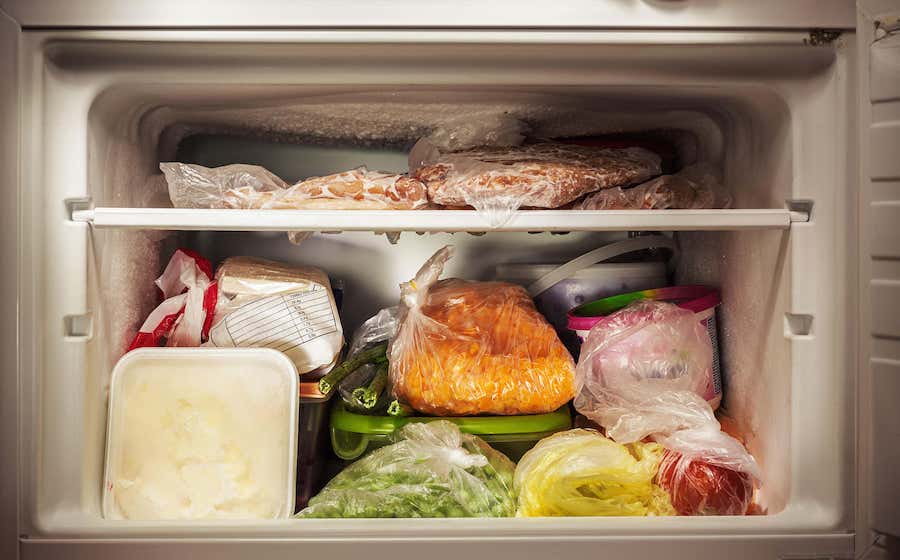Surprising foods you didn’t know you could freeze – and how they could help you save money
As food continues to be difficult to afford, your freezer could be the budget-saver you need
Food isn’t cheap right now, and keeping food fresh to get the most out of it is a challenge. But, many of us may have one tool at our disposal that could kill two birds with one stone – our freezer.
View this post on Instagram
There are so many foods that people could be freezing, instead of letting them go in the bin, and there’s very little that you can’t freeze. The key is knowing how to freeze them, and what to do with them afterwards.
So, what surprising foods can you freeze?
1. Cheese

Cheese has become seriously expensive
“Cheese is a great one to freeze if you ever waste it, especially considering it’s now around £8 per kg,” says content creator Kate Hall, aka The Full Freezer, who is trying to help families find new ways to cook, eat and save.
“Simply grate hard cheese before freezing, then use it in cooking straight from the freezer. It’s best used within six to nine months.”
2. Milk and yoghurt

You could freeze discounted dairy items
You can also freeze other dairy products, such as milk and yoghurts.
“These do tend to separate when frozen, so may need whizzing back together with a hand mixer, or used in cooking,” says Hall.
“Frubes yoghurts, which are around £2.25 for nine, are perfect for freezing, and because they’re in a tube, they don’t take up much space in the freezer. Once frozen, they can be eaten as dairy ice lollies, my kids love them!
“Or pop them in a lunchbox, they’ll defrost by lunchtime, giving kids a yummy, cool, nutritious snack. Frozen milk is best used within six months, and yoghurts within two months.”
3. Potatoes

You can’t freeze potatoes raw
Believe it or not, you can freeze spuds.
“Potatoes can be frozen in all sorts of ways – just not raw – but one of the easiest options, if you have a big bag, is to mash them as you normally would,” she explains.
“Freeze the mash flat in freezer bags – in usable portions so they don’t take up much space in the freezer – then when you want it, just heat through in a pan straight from frozen.
“It’ll look like it’s spoilt, but you just need to keep stirring until the excess water has evaporated. Frozen potatoes are best used within three months, but they’ll be safe to eat for longer than this, the quality will just deteriorate,” Hall adds.
“Whilst a bag of potatoes may only cost 70p per kg, considering the UK wastes 4.4 million potatoes every day, there are some savings to be made by freezing them, rather than binning them.”
4. Treats and snacks
Are your biscuits going soft? Is the cake going stale? Use your freezer.

You can keep popcorn in the freezer
“If you ever find your cake, biscuits, popcorn or crisps go stale before you can get through them, or if you want to make them last a bit longer, storing them in the freezer is a great option,” Hall says.
“Slice up any cakes and freeze open on a tray before moving them to a freezer bag if they’ll be in there longer than a month or two, then wrap each slice in foil once frozen solid, to protect it from the cold.
“Crisps, popcorn and biscuits can be popped straight into a freezer bag and enjoyed straight from the freezer, just remember to label the bag with what exactly is inside,” she explains.
This is a great way to make a saving on kids’ lunchboxes, or picnic fillers.
Food saved, money saved
According to the Waste Resources Action Programme, the average family is wasting £730 worth of edible food every year. That’s £60 worth of food every month.
“By freezing food, we can save this £60 per month, and reduce the amount spent buying more food to replace those thrown away, particularly bread, milk, fruit and veg,” says Hall.
“Our family have found that having a stash of ingredients in the freezer, which can be cooked quickly from frozen, has helped us to reduce our reliance on takeaways and expensive convenience foods.
“We were previously spending around £20-30 every week on takeaway, but we now just have it once a month.”
This is great for family budgets. “Being able to save food by freezing it can help families to stretch their budgets further, and feel more in control when food shopping,” she says.
“Knowing that you can buy items in bulk for less per unit, and freeze the excess, is a useful way to make the most of your weekly shop.”
The Press Association
Latest posts by The Press Association (see all)
- Best places to see bluebells this spring - April 2, 2025
- Does sunscreen expire? Everything you need to know about SPFs - April 2, 2025
- Top Gun and Batman star Val Kilmer dead at 65 - April 2, 2025
- Actor Richard Chamberlain dies aged 90 - March 30, 2025
- 5 new books to read this week - March 26, 2025




















